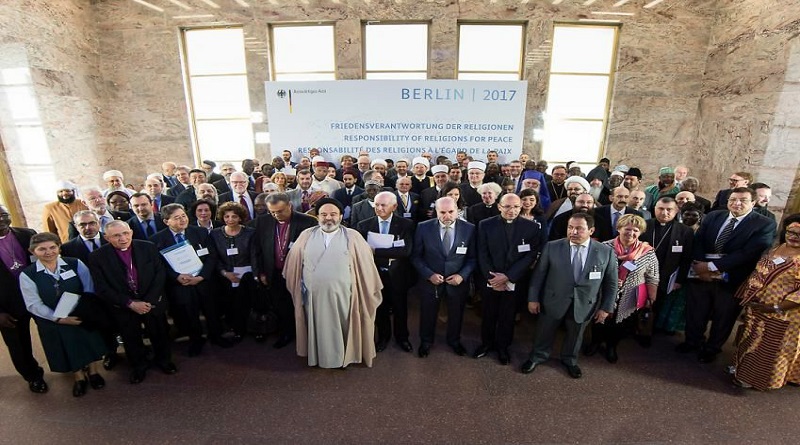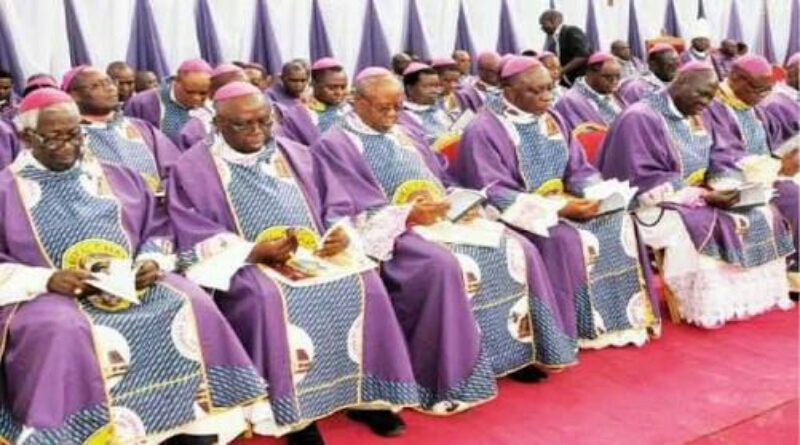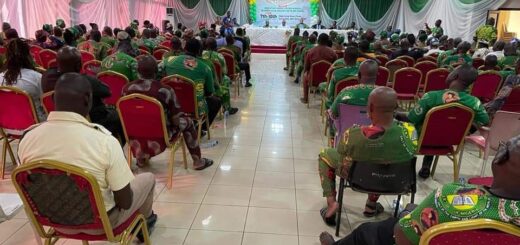OPENING ADDRESS AT THE CBCN SECOND PLENARY, JALINGO TARABA STATE
OPENING ADDRESS BY THE PRESIDENT OF THE CATHOLIC BISHOPS CONFERENCE OF NIGERIA, MOST REV. IGNATIUS A. KAIGAMA, DURING THE SECOND PLENARY MEETING IN JALINGO, TARABA STATE, 10TH SEPTEMBER, 2017
INTRODUCTION
We praise and thank God for the second plenary of the Catholic Bishops’ Conference of Nigeria at this period which the Catholic Church in Nigeria has declared as a Marian Year in honour of the Centenary of the apparitions of the Blessed Virgin Mary in Fatima Portugal. We look forward to a national celebration in Benin City from October 12th to 14th during which we hope to re-consecrate our nation Nigeria to the Immaculate Heart of Mary, following the one done in 1954.
THE MARIAN YEAR AND NATIONAL PEACE AND HARMONY
We, Catholics, celebrate Mary as an icon of holiness and a model of total submission to the will of God. The circumstance, which led to her appearances and messages in Fatima in 1917, was the raging First World War. As peace was eluding the world, she asked humanity to practice reconciliation, repentance, forgiveness, conversion, purity of life, etc. Here in Nigeria, the heat emanating from agitations by various groups over various interests is capable of distracting us from the path of peace and plunging us into chaos if not handled with care. There is therefore, urgent need for forgiveness and reconciliation between ethnic groups, and religious communities; wounds need to heal and those groups feeling marginalized need to get the desired attention. The activities of armed herdsmen, which have ruptured the peace and harmony of the nation, must be halted. This can be done by substituting the open grazing practice which has always generated conflicts between pastoralists and farmers with ranching as is done in Europe and other African countries. We must intensify effort to avoid the polarization of this country on ethnic or religious grounds and should rather concentrate our energy on how to work sincerely together to provide enough food for the poor, rehabilitate our roads which are riddled with trenches and gutters, establish health facilities in rural areas to reduce mortality rate, and ensure that our schools do not go on strike and university facilities do not remain obsolete and dilapidated. Our very brilliant doctors, engineers, academics, etc and our promising youth should be persuaded not to flee the shores of this country in search of greener pastures; human trafficking which exposes our youth to terrible dangers must be curtailed and religion or ethnicity never used as criteria for political decision making or the allocation of the dividends of democracy.
APPRECIATION TO JALINGO DIOCESE AND JOS PROVINCE
We sincerely thank Bishop Charles Hammawa and the priests, religious and faithful of Jalingo Diocese for hosting the Catholic Bishops of Nigeria, just as we thank the people of God in Jos Ecclesiastical Province comprising the Dioceses of Yola, Maiduguri, Bauchi, Shendam, Pankshin and the Archdiocese of Jos for co-hosting with Jalingo this epoch making event. Bishop Hammawa used to say that some people often ask him if Jalingo is in Cameroun. Now we know that Jalingo is not only in Nigeria, but that it can also play a tremendously vital role in the economic transformation of Nigeria. My village Kona where I was born is about ten minute-drive from here. Barely two weeks ago, the Vice President Prof. Yemi Osinbanjo commissioned the road leading there, built by Governor Darius Dickson Ishaku bof Taraba State; a road which since I was growing up was always in a deplorable state and which over the decades never received government attention. Today you can travel on it even with your eyes closed! I believe that these are the sort of facilities rural communities, all over Nigeria, should enjoy, namely, a well maintained road network, steady electricity, good water supply, good learning environment, effective primary and secondary health care, prompt and constant access to fertilizer and modern farming equipment, etc.
CAPITALIZING ON EXISTING POTENTIALS FOR PEOPLE-BASED DEVELOPMENT
God has done his part in blessing our country, Nigeria, with abundant resources. It is our turn to do ours by imbibing the culture of hard work, selflessness, merit and devotion to the common good. We have more natural resources beyond oil and if these resources are effectively tapped and the proceeds put to good and honest use, we can effectively improve the socio-economic lives of our people, thereby reducing crime, violence and conflicts. Taraba State, for example, produces quality timber, tea and has the capacity to generate electricity from the Mambilla Plateau. I understand that the Federal Executive Council in their last meeting approved the Mambilla hydro power plant at the cost of $5.79 billion to generate over 3,000 megawatts of electricity for Nigeria. In Plateau State where I come from, there are huge agricultural potentials and mineral deposits to be extracted. This is the same with many other states. Nigeria is indeed blessed.
A VERY WARM WELCOME TO THE APOSTOLIC NUNCIO TO NIGERIA
We are very happy to welcome our new Apostolic Nuncio, His Excellency Antonio Guido Filipazzi, formerly, Nuncio in Indonesia. We pray for you, Your Excellency, for a successful apostolate and we assure you of our maximum cooperation as you represent the Holy Father among us. We reaffirm our unconditional loyalty to the successor of St. Peter, Pope Francis. It is not in our character to do anything contrary to what the successor of St. Peter decides. All that the Pope tells us to do, we shall do. While wishing you success and a fruitful service in Nigeria, we extend hearty gratitude to your predecessor, Most Rev. Augustine Kasujja, who served with great merit in Nigeria for over six years and is now the Apostolic Nuncio in Belgium.
PASTORAL PEACE IN AHIARA DIOCESE
We deeply appreciate His Holiness Pope Francis for his paternal intervention in the situation that evolved following the appointment of the Bishop of Ahiara Diocese. This generated turbulent and negative reactions that have left the diocese without the pastoral care of a chief shepherd. As our Lord Jesus intervened to calm the storm (cf. Lk 8:22-25), the Holy Father has intervened and we pray that discerning and obedient priests, religious and laity will allow the storm to remain permanently quiet, so that pastoral life can continue unhindered in Ahiara Diocese. Your Excellency the Apostolic Nuncio, kindly convey to His Holiness our deep appreciation for his prayer and pastoral solicitude for Ahiara Diocese and indeed for the Church in Nigeria. We commend those groups and individuals who stood up in defense of the Church’s integrity and supported the decision of the Holy Father for Ahiara Diocese. We acknowledge the leadership of the Bishops of Owerri Ecclesiastical Province and commend organizations such as the Knights and Ladies St. John International District 9 who declared in a communiqué published on 30th July, 2017, “… total submission to the will of God and anxious anticipation of the installation of the Roman Catholic Bishop of Ahiara Diocese, Most Rev. Dr. Peter Ebere Okpalaeke, …and remain resolute and committed to the cause of the church”. Similarly, we commend the Ahiara Diocesan Catholic Women Organization (ADCWO) who in a letter of 2nd August 2017 pledged their “usual loyalty to the Holy Father and to the Church, and who will always be obedient and faithful to the Church’s teaching”. Some priests and lay people from Ahiara Diocese have also expressed similar positive sentiments. Now is the time to draw lessons from what happened so as to avoid any future occurrence. It is no time for a blame game or for celebrating who won or who lost. What matters is that Jesus triumphs always.
DEALING WITH THE AFTERMATH OF BOKO HARAM INSURGENCY
On the national scene, I wish to note that the activities of Boko Haram have been more felt in our Province than elsewhere. The Diocese of Maiduguri covering Borno, Yobe and parts of Adamawa States, the Diocese of Yola consisting Adamawa State and some parts of Bauchi State, Taraba State and Plateau State have suffered either directly or indirectly the consequences of Boko Haram insurgency and attacks by armed herdsmen. The Catholic Dioceses, especially of Maiduguri and Yola, did not only suffer great losses but have been major providers of humanitarian relief to those affected. It is curious however that the Presidential Committee of the North East Initiative saddled with coordinating all private, national and international interventions to rebuild the North East region does not include any of the Bishops who have remained with the people and actively supported thousands of internally displaced people. It needs to be noted that we are not out of the woods yet as increasing cases of attacks and killings by Boko Haram have been reported and so prompt proactive measures need to be taken.
MINORITY GROUPS IN NIGERIA
I wish to touch, briefly, on the plight of ethnic minority groups in Nigeria. The Southern Kaduna seemingly unending crisis should be an eye opener that social justice and political rights should never be compromised. Where historical social/political injustice is not remedied, we can only expect recurring crises. Many groups in Nigeria feel deprived on grounds of religion or ethnicity and more than a few of these have justifiable grounds to feel that way. Permit me please to use an example I am most familiar with. Documented historical records show that on Christmas day 1892, there was an invasion of Kona which was surrounded by a fortress. This was led by a French Navy, Lieutenant Louis Mizon, seeking to secure the territories of Adamawa, Borno and Baghirmi for France. The Emir of Muri Muhammadu Nya (1874 – 1897) requested Lt. Mizon to help him to conquer the Jukun of Kona whom the Emir had tried to conquer unsuccessfully for many years. Using modern weapons, Lt. Mizon attacked Kona overpowering the natives who relied only on their arrows and spears. Thousands were killed, displaced or enslaved. Thus, was conquered the land which for one hundred years (1792 – 1892) the Fulanis sought to gain political control of. Part of the administrative re-structuring that followed under the colonial administration recognized the Chief of Kona Banojiri (1894–1906) as a district head and a third class chief. Under Emir Muhammadu Mafindi (1903 – 1953) Kona chiefdom was reduced to a village status in 1936 and merged with Jalingo district. For whatever reason, the chief of Kona remains a village head up to today. One of the districts carved out of Kona district, is today a Local Government area with two third class chiefdoms, while Jukun Kona people are still headed by a village head! Such social/political injustice not only in Jukun Kona land but also in different parts of Nigeria left unaddressed are the triggers of social tension, hostility and lingering enmity with perceived oppressors. Other factors promoting disharmony and inflaming passion in Nigeria which must be looked into include various federal institutions and positions, like recruitment into the military or paramilitary, admission into tertiary institutions, and allocation of key ministries, the so-called “juicy ministries” on grounds of ethnicity or religion rather than merit. Politically, the delineation of electoral wards or constituencies are sometimes done deliberately not to favour ethnic minorities, denying them a voice in the political scheme of things. Some of the agitations being denounced today are rooted in reasons of perceived exclusion.
PROMPT REACTION TO CRISES
Many people were highly edified by the effective and coordinated response of the federal government to the crisis in Mambilla, Taraba State. The Minister of the Interior, in company of the National Commandant Nigeria Security and Civil Defence (NSCDC), arrived Jalingo and had a meeting with the Executive Governor of Taraba State. All the security arms showed much concern in making sure that the crisis did not fester. During previous mayhem caused by herdsmen in Agatu, Katsina Ala in Benue State, or during the Southern Kaduna massacres and killings in Ussa, Takum, Donga and Ibi in Taraba State, there was hardly any effective response by the Federal Government as was done in Mambilla. The commendable, prompt response in the case of Mambilla crisis should be the manner and model of response to all crises moments or situations.
HUMAN TRAFFICKING
On the international level, I wish to dwell on the issue of human trafficking. I was invited to Lamezia Terme, Catanzaro (Calabria) and Rome, Italy, from the 9th to the 11th of May, 2017 to participate in a discussion on human trafficking. Listening to many groups and agencies working to stop human trafficking and helping victims, I realized that in 2016 alone 16,000 Nigerians were victims! I came to understand also that there is a “Nigerian mafia” involved. Many Nigerians are in prison in Libya and Morocco, some engaged in prostitution or doing cheap labour under sub-human conditions, but hoping, someday, to make the very dangerous journey across the Mediterranean Sea to Europe. In a place called Castello Volturno, near Napoli, there is almost a colony of Nigerians engaged in crimes, drugs, and prostitution despite the presence of over fifty new generation Nigerian “churches”! Certainly, something more serious should be done about this by the relevant authorities and the Nigerian government.
CONCLUSION
In concluding, I wish to say that Nigerians need more cheery news. We need to hear that the billions of Naira, Dollars, Euros and Pounds diverted from serving the poor are not only recovered but put to very good use; that prices of foodstuff are becoming more affordable; that roads or rail lines are being built and regularly maintained. We want to hear such news that our sportsmen are winning, like the female basketball team women players who just won the women AfroBasket tournament in Mali and the Super Eagles who trashed the Indomitable Lions of Cameroun 4-0 in the World Cup qualifier. We need news that our universities of science & technology or agriculture are making innovations or discoveries to make life easier for ordinary people; that professionals in their millions, who left Nigeria for greener pasture abroad, are returning because there is emphasis on merit and competence and that government leaders are putting people first. We want to see our religious institutions addressing real social problems rather than the unnecessary display of superiority by adherents of Islam and Christianity who sometimes engage in hate speeches and adopt confrontational postures over trivial matters instead of warmly embracing one another and providing healing and reconciliation where necessary. It would be good news if the teeming unemployed youths gallivanting the streets were usefully engaged in agricultural schemes, considering that we have such expansive, fertile land all over the country so that our proclaimed exit from recession would translate into reduction in the price of corn, palm oil, cement, transport, etc. It will please us no end to hear no more ever of any “quit notice” issued against any group of Nigerians or of such an attack on innocent worshippers in Ozubulu in Anambra State or the kidnap and killing of a priest in Otukpo, Benue State and only some few days ago in Orlu, Imo State. Let us build a country where no innocent Nigerian or priest would be shot in an armed robbery attack after morning-prayer as has happened in Lagos a few days ago as well. Since our last Conference we have had the pleasure of witnessing the ordination and installation of Bishop Donatus Akpan for Ogoja Diocese and Bishop Hilary Nanmaan Dachelem, CMF for Bauchi Diocese. We congratulate and welcome their lordships to our Conference and thank the Holy Father for filling these Sees which have been vacant. We also congratulate the Archbishop Emeritus of Calabar, Archbishop Joseph Ukpo, on his 80th birthday. May we have more reasons to celebrate such joyful events in the Church and in the whole country. We welcome our President, His Excellency Muhammadu Buhari, back from his medical vacation and pray for sustained good health for him to enable him lead Nigeria to the path of genuine peace, national cohesion and infrastructural development. On this note of optimism and trusting in God’s watchful care over our beloved Nigeria, I hereby humbly declare our 2nd plenary of the Catholic Bishops’ Conference holding in Jalingo open.




